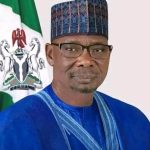David Odama
Vice President, Sen. Kashim Shettima, said on Saturday that partnership with private sector was critical in the nation’s quest for development, transformation and advancement.
The vice president also challenged Nigerian especially those saddled with position of authorities to invest hugely on the skills and knowledge development especially the youths to grow in health, education and infrastructure development in the country.
Speaking at the launch of Nasarawa State Human Capital Development Agency Strategy Document and Gender Transformative Policy Framework in Lafia, the Nasarawa State Capital, the vice President said with the Nigeria’s population projected hitting over 400 million by 2050 and to become the third most populous nation in the world, there was urgent need for leaders at all levels including the private sectors to collaborate.
According to vice president Shettima, the progress envisaged in human capital development is achievable with shared commitment to collaborate acknowledging the high cost of conflict in service delivery.
“These are not mere goals. They are the promises embedded in our Human Capital Development Programme, Nasarawa State is endowed with tremendous potentials to develop and sustain educational outcomes, especially within the north-central region”.
“Unlike many states facing the challenge of reducing out-of-school rates, particularly at the secondary level, and improving net attendance, there are promising opportunities for progress in Nasarawa state”.
“We must prioritize enrollment and completion rates through targeted interventions, such as expanding social welfare programs, enhancing school infrastructure, and strengthening teacher recruitment and training”.
“It is projected that by 2050, Nigeria will surpass the United States, who will be the third most populous nation on earth, with a population of 440 million people. With all these indices, the leaders must brace up to facilitate access to resources, expertise and innovation to make human capital development a cornerstone to a competitive Nigeria”.
Shettima who lauded the Nasarawa State Government for exceeding the international benchmark of allocating 15% of its budget to education, noted that education, youth development, health constitute major priorities towards translating strategy into tangible outcomes.
In his remarks, Nasarawa State Governor, Abdullahi Sule, said the documents launched represent the commitment of government towards the realization of measurable and sustainable results in human capital development through a system that works for the people.
Sule promised to fully implement the policies in the documents to prioritise skill growth and accelerate education, healthcare, infrastructure, gender inclusion by 2030, adding that his administration’s economic strategy is designed with flexibility and adaptability to respond to emerging trends and to remedy global challenges.
He commended the contributions of the Federal Government, donor partners and the State Human Capital Development Agency for making the documents a possibility.
Earlier, the Director-General/Focal Person, Nasarawa State Human Capital Development Agency, Habiba Balarabe Suleiman had explained that launching the human capital development strategy documents underscored the culmination of policy direction and a new beginning in the realisation of an inclusive, equitable and economically enabling society.
Suleiman stated that Nasarawa remain the sole authority of the strategic documents of addressing human capital development hence the establishment of its agency which he said has translated the thematic areas of development into full opportunities in the state.






